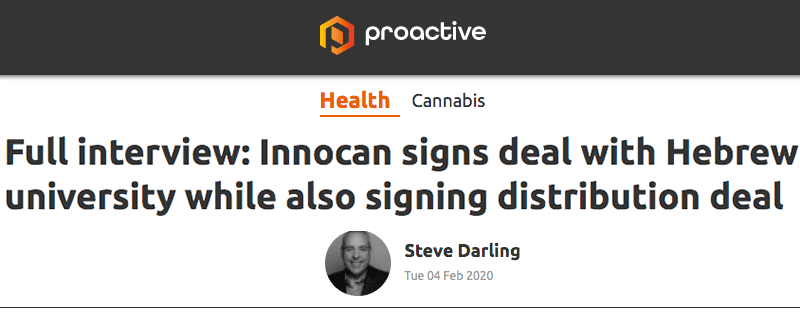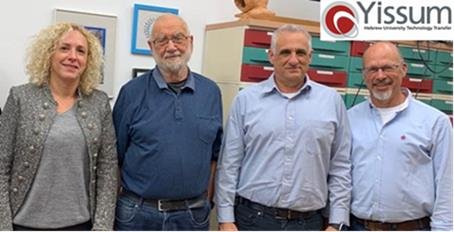Editor’s note: Hebrew U’s Prof. Chezy Barenholz and Prof. Alberto Gabizon previously developed Doxil, an anti-cancer drug approved for the treatment of Kaposi’s sarcoma, ovarian cancer, multiple myeloma and breast cancer. Doxil is one of the blockbuster products commercialized by Yissum, the technology transfer company of The Hebrew University of Jerusalem.

Innocan Pharma (CSE: INNO) CEO Iris Bincovich joined Steve Darling from Proactive Vancouver from Toronto with news the company has signed a deal with the distribution company Active Therapeutics. This agreement allows Innocan to move into the U.K. and Ireland.
Bincovich also told Proactive about the work they will be doing with Hebrew University and also about a new board member who comes with a very big resume.
Hebrew U’s Prof. Chezy Barenholz is Head of Membrane and Liposome Research Lab, Hebrew University Hadassah Medical School, Jerusalem and head researcher and supervisor under the Yissum Agreement with Innocan.

InnoCan’s project with Yissum is targeted at developing a breakthrough technology platform that enables the delivery of cannabinoids by injection of hydrogel-cannabinoid-loaded (such as CBD) liposomes into the blood stream or to a specific body part. The controlled release of CBD (or other cannabinoids) from the liposomes may allow continuous exposure of the patient to the cannabinoid and decreases the variations of CBD concentration in the blood caused by food intake or other physiological condition. Moreover, through injection of loaded liposomes, a greater portion of intact CBD can reach its target site, decreasing the total amount of CBD needed to achieve the desired therapeutic effect. The use of the technology is versatile and may be tailored to the development of different cannabinoids.
On the latest research results released on January 13, 2020 Prof. Barenholz said, “This is a significant milestone and creates the basis for the development of therapeutically meaningful New Drugs, based on local injection of CBD, that could have greater efficacy and promote the well-being of patients suffering different ailments.”
The latest research achieved the following results:
- High loading of CBD was achieved. The loaded amount is sufficient for administration of a therapeutic dose.
- Several types of CBD liposomal formulations were developed having potential of targeting a variety of clinical indications for CBD injection administration.
- The liposomal formulations may have the potential to enable a controlled release delivery of injectable CBD.